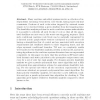Free Online Productivity Tools
i2Speak
i2Symbol
i2OCR
iTex2Img
iWeb2Print
iWeb2Shot
i2Type
iPdf2Split
iPdf2Merge
i2Bopomofo
i2Arabic
i2Style
i2Image
i2PDF
iLatex2Rtf
Sci2ools
152
click to vote
WADS
2001
Springer
2001
Springer
On the Complexity of Scheduling Conditional Real-Time Code
Abstract. Many real-time embedded systems involve a collection of independently executing event-driven code blocks, having hard real-time constraints. Portions of such codes when triggered by external events require to be executed within a given deadline from the triggering time. The feasibility analysis problem for such a real-time system asks whether it is possible to schedule all such blocks of code so that all the associated deadlines are met even in the worst case triggering sequence. Each such conditional real-time code block can be naturally represented by a directed acyclic graph whose vertices correspond to portions of code having a straight-line flow of control and are associated with execution requirements and deadlines relative to their triggering times, and the edges represent conditional branches. Till now, no complexity results were known for the feasibility analysis problem in this model, and all existing algorithms in the real-time systems literature have an exponenti...
Algorithms | Feasibility Analysis | Feasibility Analysis Problem | Time Exact Algorithm | WADS 2001 |
Related Content
| Added | 30 Jul 2010 |
| Updated | 30 Jul 2010 |
| Type | Conference |
| Year | 2001 |
| Where | WADS |
| Authors | Samarjit Chakraborty, Thomas Erlebach, Lothar Thiele |
Comments (0)

